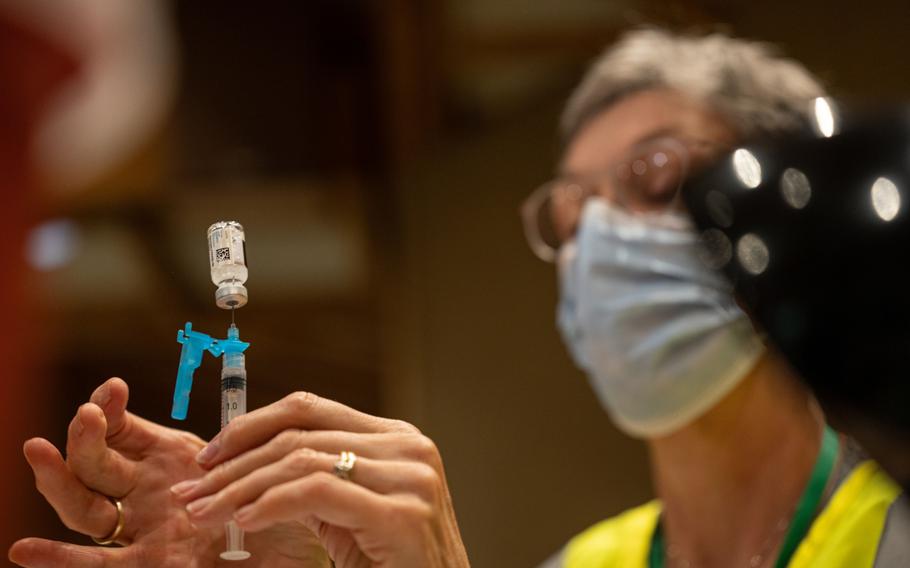
A healthcare worker fills a syringe with a dose of the Johnson & Johnson Covid-19 vaccine at a vaccination popup location inside the Louisville Zoo in Louisville, Ky., on Aug. 6, 2021. (Jon Cherry/Bloomberg)
DAYTON, Ohio (TRIBUNE NEWS SERVICE) — A panel of Wright-Patterson Air Force Base physicians urged listeners on social media Thursday to get vaccinated, saying the vaccine is the best way to stay out of the hospital and avoid COVID’s long-term complications.
“I can tell you the best protection for staying out of the hospital is to get vaccinated,” said Dr. Devin Kelly, chief of infectious disease for the 88th Medical Group at Wright-Patterson.
Thursday’s Facebook session was scheduled last week. But it came on the heels of a memo from Secretary of Defense Lloyd Austin this week directing the military to begin mandatory vaccinations.
The 88th Air Base Wing, the custodian unit overseeing Wright-Patterson, is awaiting Air Force guidance on administering mandatory vaccines, a wing spokeswoman said.
“The department and the services are currently updating the vaccination policy and services are beginning execution plans,” a base spokeswoman said. “The department requires many vaccines for its service members and executes on these mass vaccination requirements frequently and will be able to quickly administer the vaccines.”
Just over half of the U.S. population is fully vaccinated at this point. There have been about 36.6 million COVID-19 cases in the U.S., but among those vaccinated, only just over 8,000 people have been hospitalized, with 1,587 fatalities, base doctors said, citing data from Johns Hopkins University.
“We do see some breakthrough cases in fully vaccinated individuals,” Kelly said. But according to national numbers, most infections these days are happening among those who have not received a vaccine.
“Where that surge is coming from is our unvaccinated personnel,” said Col. Patrick Miller, installation commander at Wright-Patterson. Where breakthrough cases exist, they tend to show milder symptoms with fewer instances of hospitalization, physicians said.
Right now, there’s a case fatality rate of 1.7% in the U.S. from COVID, internist Dr. Andrew Berglund said. It’s good that death rates are low, but there can be enduring side effects from COVID, he warned.
Berglund said he knows of “a lot of young, active-duty people” who have survived their infections but can’t run as far as they once could or who find themselves in pulmonary clinics with enduring symptoms.
“They’re almost worse six months later, and no one knows why,” he said. “It’s an area of active research.”
Right now, there are no treatments for long COVID, he added.
On the other hand, severe side effects to vaccines are exceedingly rare, Dr. Katie Burtson said. But when they happen, they tend to happen within six to eight weeks of the shot. Instances of anaphylaxis also tend to happen quickly, which is why patients who have received the vaccine are asked to wait 15 to 30 minutes before leaving.
“We really don’t see patients with long-term consequences past that eight-week mark,” Burtson said.
Austin has officially mandated the COVID-19 vaccine for the military, sending a memo a day after the Food and Drug Administration granted full approval to the Pfizer-BioNTech version of the shot.
But at this writing, neither Austin nor the Air Force have publicly established a deadline by which service members are expected to be vaccinated.
Austin directed the secretaries of the U.S. military branches to “immediately begin full vaccination of all members of the Armed Forces under DoD authority on active duty or in the ready reserve, including the National Guard, who are not fully vaccinated against COVID-19.”
The Pfizer-BioNTech shot is the sole vaccine to receive full FDA approval so far. The Moderna and Johnson & Johnson shots continue to be offered under an FDA emergency use authorization.
Dr. Joshua Scott said approval for a COVID booster vaccine shot could come in a month.
___
(c)2021 the Dayton Daily News (Dayton, Ohio) Visit the Dayton Daily News (Dayton, Ohio) at www.daytondailynews.com Distributed by Tribune Content Agency, LLC.